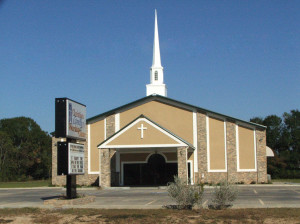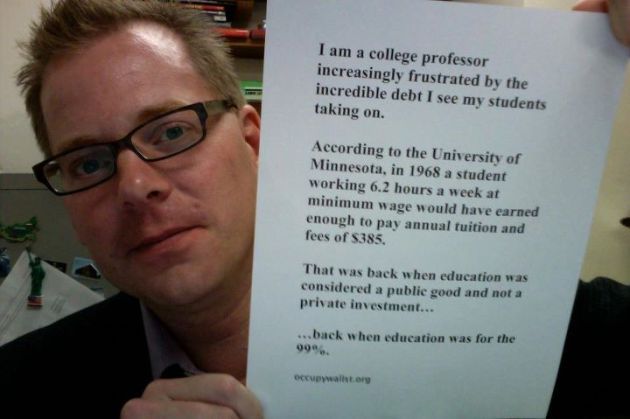I am glad you are interested in finding the perfect church.  Continue reading
Continue reading
Keys to Finding a Good Church
 The multiple life transitions of young adulthood make it essential for EAs to find a new community. Part of a new community for a disciple of Christ is finding a group of Christians who can encourage and support you in your journey. Continue reading
The multiple life transitions of young adulthood make it essential for EAs to find a new community. Part of a new community for a disciple of Christ is finding a group of Christians who can encourage and support you in your journey. Continue reading
Hamline professor’s post on student loan debt goes viral.

The cost of education has sky-rocketed, and students are often left with debt that will follow them the rest of their lives. Here is one teacher who is speaking out against the debt load of students. Apparently people agree, because the picture went viral. Here is an article on it.
The Bible warns Christians about the power and problems of financial debt. Talk to your children about debt, and make wise decisions about what type of education you can afford.
I will know that I am healing…
 I am still hurting. When the pain fades, then I will know I am healing.
I am still hurting. When the pain fades, then I will know I am healing.
I am still grieving. When I see the future, then I will know I am healing.
I am still drifting. When my anchor hits the Rock, then I will know that I am healing.
I am still unable to trust others. When I reach out, then I will know that I am healing.
I am still running. When the running stops, then I will know I am healing.
I am still disillusioned. When the fog clears, then I will know that I am healing.
I am still vengeful. When retribution is surrendered, then I will know that I am healing.
I am still weakened. When my strength is irrelevant, then I will know that I am healing.
I am still timid. When courage revives, then I will know that I am healing.
I am still angry. When hatred is overwhelmed by forgiveness, then I will know that I am healing.
I know that I am healing because healing is a process with an end. What seems impossible to us is not with Him at our side. He is the great Healer, and He awaits me at the conclusion of this journey.
May you continue in your healing – this too will pass.
Missing Beckham – A Father’s Story of Loss and Healing
 Losing a child is the single most difficult emotional, spiritual, and physical journey of my life. In the immediate days and week following the stillbirth of Beckham, I felt the extreme emotions of anguish and peace, despair and hope, love and hate, doubt and trust. The pendulum of emotions feels like being stuck in the ocean’s rough surf. You’re struggling to catch your next breath and to clear your stinging eyes before the next wave forces you under.
Losing a child is the single most difficult emotional, spiritual, and physical journey of my life. In the immediate days and week following the stillbirth of Beckham, I felt the extreme emotions of anguish and peace, despair and hope, love and hate, doubt and trust. The pendulum of emotions feels like being stuck in the ocean’s rough surf. You’re struggling to catch your next breath and to clear your stinging eyes before the next wave forces you under.
I found it difficult to be alone (at times feeling as if I would suffocate). I could not focus on work (I had to take an extended break). I tried to distract myself with entertainment, but that only brought short-lived relief. I wanted to disengage from the rhythms of life (friends, church, work, etc.) but forced myself to reengage. My entire being was consumed by my burden of grief.
My grief came from being unable to raise my son. I will never get to change his diapers, see him take his first steps, hear him speak his first words, watch him graduate from school, get married, have kids, or tell him about Jesus and how much God loves him.
I will remember Beckham every day of my life for the rest of my life. I will always think about what he would be doing if he were here with us. I will get through my grief, but I will never get over my son. Some have compared it to having a limb of your body amputated…although you heal, you are never the same again.
Our community surrounded us with love during our time of loss. Helping with the practical needs of the family like food, house-cleaning, and childcare allowed us time to grieve. My sister gave us a beautiful evergreen scented candle. This gift led us to plant an evergreen tree in our backyard to celebrate his due date.
During this time, I read Is God to Blame? by Greg Boyd. He writes that the death of a child is a “mystery about creation and not a mystery about God’s character.” In other words, don’t blame God and let go of the WHY question. You don’t have to confuse the hurt with the Healer. He loves you, loves your child, and knows what you’re feeling. Things won’t always go the way that we think they should, but it is true that God will be there with us every step of the way. Trust in God’s goodness and remember that the Day is coming when all things will be made new.
 Sensing God’s gracious touches at every point in my grief helped me in my journey. I have felt God’s presence at every step. He hears every note of my lament and graciously met my pain in ways that heal me.
Sensing God’s gracious touches at every point in my grief helped me in my journey. I have felt God’s presence at every step. He hears every note of my lament and graciously met my pain in ways that heal me.
On December 26, 2011 at 4 AM, as I stood sobbing in the ER, I realized the truth that God knows what it is like to lose a Son. I spoke it out loud as I stood huddled in the arms of the hospital chaplain. I say it again in the moments when I feel the darkness overwhelming me. For the darkness cannot overcome the truth of the light (John 1:6).
I will get through the experience of grief, but I will never get over my son! I will think of him EVERYDAY of my life till I get to meet him in heaven. The theme of my second year since Beckham’s stillbirth has been to ARISE. I sense God showing me that I can arise from my grief and dare to hope that life will be beautiful again.
In my journey, a year was just the beginning. In order to fully embrace the grief process, you must be patient with yourself. Only you know how long and in what ways you need to grieve to heal and find that new normal.
For those of you who are in the midst of your own journey. Please know that you will heal. And although you won’t be the same person, you will find a new normal. Keep your head up as much as possible, for even in the midst of pain there are moments of hope, comfort, peace.
Written by Bret Deneson and Dr. G. David Boyd
How to Help those who have Lost a Child.

Early adulthood is a time when one gets married, and has children. Right? But what happens when the happy couple’s dreams come to a grinding halt. In the middle of settling into their adult lives, some emerging adults come face to face with one of the hardest situations that they will ever face – the death of a child. Continue reading
Finding Healing after Losing a Child

Early adulthood is a time when one gets married, and has children. Right? But what happens when everything that seemed to be moving ahead comes to a grinding halt. In the middle of settling into their adult lives, some emerging adults come face to face with one of the hardest situations that they will ever face – the death of a child. Continue reading
After they have gone…
 I grew up going to church every Sunday with my family. As the youngest of four boys, we drove each Sunday to church in a little Chevet Diesel. It was a little tight at times, and let’s just say that we didn’t always wear our seatbelts. Continue reading
I grew up going to church every Sunday with my family. As the youngest of four boys, we drove each Sunday to church in a little Chevet Diesel. It was a little tight at times, and let’s just say that we didn’t always wear our seatbelts. Continue reading
Needing to know, “Why they left their faith?”
![437864_89164372[1]](http://www.earesources.org/wp-content/uploads/2013/10/437864_891643721-300x228.jpg) If you believe the statistics, most students who attended church as children leave their faith during the early adulthood years. Parents whose children turn away from the faith, often wonder why the child who once did everything at church – youth group, Sunday School, VBS, and even went on a mission trip, could just simply walk away? Continue reading
If you believe the statistics, most students who attended church as children leave their faith during the early adulthood years. Parents whose children turn away from the faith, often wonder why the child who once did everything at church – youth group, Sunday School, VBS, and even went on a mission trip, could just simply walk away? Continue reading
Still Asking, “Who am I?”
 Who am I?
Who am I?
Is this just a question for adolescents as they seek to find a seat in the junior high lunch room? Or fit in among the various high school peer groups? Or is it a question asked by emerging adults as they try to set a course for their life? It is a question that all people ponder at various points in their lives, regardless of age. I know there are many days when I ask myself that question (and I am way beyond the EA years.)
Asking who we are springs from our human desire for individuality, or to be known (by ourselves and others). We do not want to be lost in a crowd, but desire to be unique and known. Identity formation is the process of developing a distinct personality in which characteristics are possessed and by which a person is recognized or known. Concepts within identity formation include: vocation, personality, sexuality, community, affiliation, values, and beliefs. Developing one’s identity provides a sense of continuity, a sense of uniqueness from others, and the ability to seek affiliation. Identity formation is crucial to maturation and personal well-being.
Identity formation has often been seen as something done during the adolescence and confirmed by early adulthood. Recently, the concept of identity formation being completed by early adulthood has come under scrutiny. Although adolescence and emerging adulthood appear to be the lifestages when many crucial decisions are indeed faced, identity formation develops throughout an individual’s lifetime. Speaking on identify formation, Schweitzer notes,
…identity formation turns out to be a flexible and, most likely, a lifelong process. As the experience of transitional periods in life has multiplied-with changes of profession, new trainings, second and third marriages, and so forth—the need to rework and to reestablish one’s identity has also become an enduring task never to be quite completed. (Schweitzer, 2004)
Identity formation is not a single task, or something that is completed during adolescence, but is something that continues throughout the individual’s life.
In our world, many adults are judged who make changes in later life stages. They are often accused of having a mid-life crisis, or being shifty, disingenuine, or flaky. While there are people who experience mid-life crisis, the human ability to adapt at any age is healthy. The ability to adapt is a survival skill, rather than a weakness. I know that I am not the same person that I was in high school or college. Making changes in our lives reflect the continual maturation we do as humans, and the sanctification we experience as Christians.
Did Jesus experience a mid-life crisis? He changed from Galilean carpenter to Savior of the World. At all stages of life, Jesus followed the will of His father.
Exploring new directions in life is not a crisis, but could be the leading of God in your life.
Asking who you are is not a reason to panic. Decide today who you want to be. Tomorrow that may change, and that is okay. Through it all, I am “in Christ” which established my purpose and value, and I have surrendered my life to Him. All the other things in life, I am allowed to change.
Resources:
The Postmodern Life Cycle: Challanges for Church and Theology by Schweitzer.





